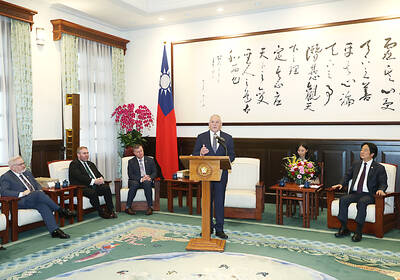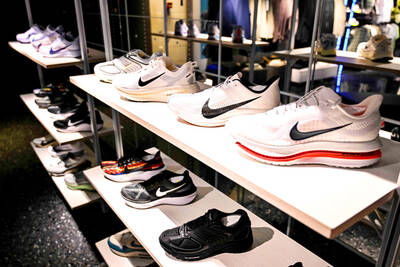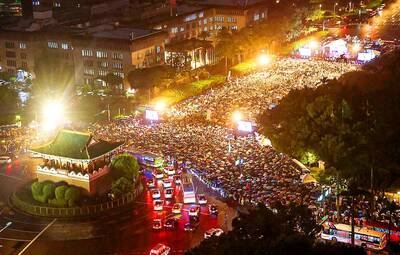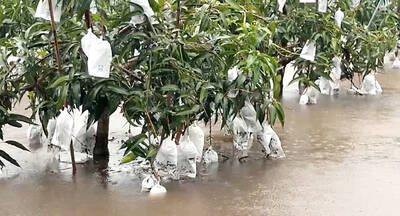President Ma Ying-jeou (馬英九) kept a very low profile on his first US stopover as president, staying in Los Angeles for about 16 hours without engaging in any public activities.
Ma was seen in public just once during his stopover, when he waved to a group of Taiwanese expatriates waiting for him outside the Westin Bonaventure.
The 36 reporters traveling with Ma didn’t get a glimpse of him after boarding the plane in Taipei, exactly the result the Ma administration hoped for in accordance with the “tacit understanding” reached with the US for the transit stop arrangements.
The Presidential Office had said the “tacit understanding” prohibits Taiwanese reporters on presidential transits from taking pictures or filming the president during his transit stop.
All photos and footage of Ma in the US were taken by the president’s photographers and the images were not made public until Ma’s charter flight to Paraguay had taken off.
Aboard the regular China Airlines flight Ma took to the US, reporters were kept away from president so that the other 300 or so other passengers would not be disturbed.
The only information given to reporters on the flight was what Ma had ordered for dinner and that he had sent a telegram to Lu Ying-chi (盧映錡), the Taiwanese weightlifter who won a bronze medal at the Beijing Olympics.
Not only did the press contingent fail to catch up with Ma at the Los Angeles International Airport, but US-based Taiwanese reporters failed to catch a glimpse of him because he left the airport directly from the runway. It took more than one-and-a-half hours for the press contingent traveling with Ma to pass through US immigration and customs.
Unlike previous trips with former president Chen Shui-bian (陳水扁) when the press contingent passed smoothly through US entry formalities, many reporters were hassled for not having the right kind of visa.
“You are supposed to get a visa in your country, but here the State Department decides whether it is valid,” an immigration officer told one reporter, adding that the visas issued by the American Institute in Taiwan were business ones, not transit visas.
The press contingent was also housed at a hotel that is about a 30-minute drive from where Ma and his entourage were staying, fueling speculation that the Presidential Office wanted to prevent journalists from photographing any US officials meeting Ma.
The US’ adherence to its “one China” policy means official communications and visits between senior officials from Taiwan and the US are banned.
Despite the restrictions, the proximity of Latin America to the US makes makes it easy for Taiwanese officials to “unofficially” use refueling stops in the US to meet US policymakers, a practice dubbed “transit diplomacy.”
Chen was a clear case in point. Before the US became unhappy with his policies, Chen was given a high-profile status on his US stopovers. In his first years in office, he made stopovers in key east coast cities, toured New York City, met US officials, received a human rights award, delivered a public speech, held a banquet for Taiwanese expatriates and watched a baseball game.
He also used transit diplomacy to make several “surprise” stops in non-allied countries. For example, in May 2005, he transited in Fiji, instead of Guam as scheduled, on his way back from visiting South Pacific allies.
A few months later, he made a stop in Abu Dhabi on his way back from Central American and Caribbean allies instead of San Francisco. His plane was then forced to make a provisional stop in Bali because of a typhoon.
Displeased with a US decision that would allow him to only make short refueling stops in Alaska or Hawaii, the next September Chen dropped a plan to stop in the US hours before leaving for Latin America, and stopped in Amsterdam, Libya and the United Arab Emirates instead.
Chen also allowed reporters to cover his US visits in spite of the “tacit understanding,” as long as the reports were not transmitted until after he left the US.
In sharp contrast to Chen, who took advantage of his transits to get much-needed publicity for the country, Ma has adopted a low-key approach to his first presidential transit stop.
The combination of scheduled commercial passenger flights and chartered flights that Ma is using is also unprecedented for a president on a state visit. In the past, only premiers or vice presidents traveled this way. There was also no send off by F-16 or Mirage 2000 fighter jets from the Air Force base in Hsinchu when Ma departed Taipei, as had been done in the past.
The different flight arrangements and keeping Ma separate from the accompanying press corps has allowed the Ma administration to minimize and depoliticize coverage of his US transit stop, making it less presidential while embodying the spirit of his “diplomatic truce” with China.
But as Ma travels on to Latin American and the Caribbean, a region where Taiwan’s allies are concentrated and many of them under growing pressure from China to switch recognition, his Ma’s “diplomatic truce” policy will be put to the test.

‘NON-RED’: Taiwan and Ireland should work together to foster a values-driven, democratic economic system, leveraging their complementary industries, Lai said President William Lai (賴清德) yesterday expressed hopes for closer ties between Taiwan and Ireland, and that both countries could collaborate to create a values-driven, democracy-centered economic system. He made the remarks while meeting with an Irish cross-party parliamentary delegation visiting Taiwan. The delegation, led by John McGuinness, deputy speaker of the Irish house of representatives, known as the Dail, includes Irish lawmakers Malcolm Byrne, Barry Ward, Ken O’Flynn and Teresa Costello. McGuinness, who chairs the Ireland-Taiwan Parliamentary Friendship Association, is a friend of Taiwan, and under his leadership, the association’s influence has grown over the past few years, Lai said. Ireland is

A saleswoman, surnamed Chen (陳), earlier this month was handed an 18-month prison term for embezzling more than 2,000 pairs of shoes while working at a department store in Tainan. The Tainan District Court convicted Chen of embezzlement in a ruling on July 7, sentencing her to prison for illegally profiting NT$7.32 million (US$248,929) at the expense of her employer. Chen was also given the opportunity to reach a financial settlement, but she declined. Chen was responsible for the sales counter of Nike shoes at Tainan’s Shinkong Mitsukoshi Zhongshan branch, where she had been employed since October 2019. She had previously worked

FINAL COUNTDOWN: About 50,000 attended a pro-recall rally yesterday, while the KMT and the TPP plan to rally against the recall votes today Democracy activists, together with arts and education representatives, yesterday organized a motorcade, while thousands gathered on Ketagalan Boulevard in Taipei in the evening in support of tomorrow’s recall votes. Recall votes for 24 Chinese Nationalist Party (KMT) lawmakers and suspended Hsinchu City mayor Ann Kao (高虹安) are to be held tomorrow, while recall votes for seven other KMT lawmakers are scheduled for Aug. 23. The afternoon motorcade was led by the Spring Breeze Culture and Arts Foundation, the Tyzen Hsiao Foundation and the Friends of Lee Teng-hui Association, and was joined by delegates from the Taiwan Statebuilding Party and the Taiwan Solidarity

TRANSPORT DISRUPTION: More than 100 ferry services were suspended due to rough seas and strong winds, and eight domestic flights were canceled, the ministry said Tropical Storm Wipha intensified slightly yesterday as it passed closest to Taiwan, dumping more than 200mm of rain in Hualien and Taitung counties, the Central Weather Administration (CWA) said. As of 11am, Wipha was about 210km southwest of Cape Oluanpi (鵝鑾鼻) and was moving west-northwest at 27km per hour (kph). The storm carried maximum sustained winds of 101kph and gusts reaching 126kph, with a 150km radius of strong winds, CWA data showed. Wipha’s outer rainbands began sweeping across Taiwan early yesterday, delivering steady rainfall in the east and scattered showers in other regions, forecasters said. More heavy rain was expected, especially in the eastern